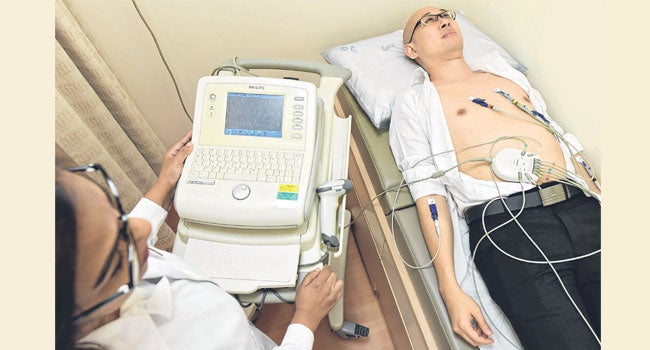
surgery may be a riskier option than for others. The calculator developed by the SGH team takes into account the demographics, lifestyle choices and healthcare systems unique to Singapore. ST PHOTO: NG SOR LUAN
A team of anaesthesiologists at Singapore General Hospital (SGH) has developed an online tool that allows doctors to more accurately gauge the risks involved before carrying out surgery.
The Combined Assessment of Risk Encountered in Surgery (CARES) calculator, as it is called, takes into account the demographics, lifestyle choices and healthcare systems unique to Singapore. It then generates a cumulative score based on nine health indicators including age, gender, anaemia and red cell distribution width. All the required data can be derived from routine pre-surgery assessments.
The score is then used to predict the patient’s percentage risk of death within 30 days and of having to stay in the intensive care unit for more than 24 hours post-surgery.
The accuracy rate of the calculator in predicting post-surgery mortality is around 93 per cent, up from 87 per cent for existing tools.
Doctors and patients can consider surgical or non-surgical alternatives, take necessary precautions to mitigate risks before the operation and make arrangements for appropriate post-surgery care.
For instance, a high-risk patient with a high anaemia score can be administered iron orally or intravenously to raise his red blood cell count before surgery, alleviating some of the risk. Intensive care beds can also be made available to patients seen as having a greater need.
The online calculator is the first in the region and stemmed from an analysis of data from more than 100,000 SGH patients who underwent surgery between January 2012 and October 2016. Findings from the study were published in March in the BMJ Open medical journal.
Dr Hairil Rizal, clinical director of perioperative services in SGH and a member of the team behind the tool, said that while there are other risk calculators, most were developed in the West and not applicable to Singapore’s population due to lifestyle and healthcare differences.
“None (of the previous models) has been validated to be accurate in the Singapore population,” he noted.
“We don’t want patients to just think about risk; we know that every operation has a benefit, so we need to compare which is more important to the patient. And now we have the tool to initiate this discussion.”
The CARES calculator can measure risk for all types of surgery except transplants, burns and cardiacrelated operations. It will be made available online in coming months.
Contributed by














 Get it on Google Play
Get it on Google Play